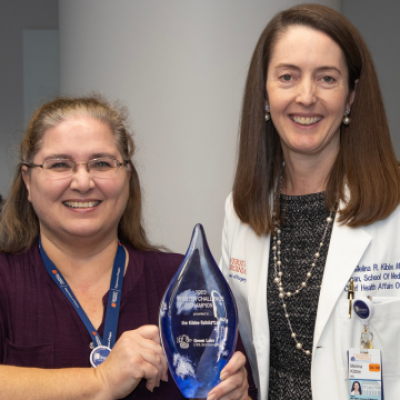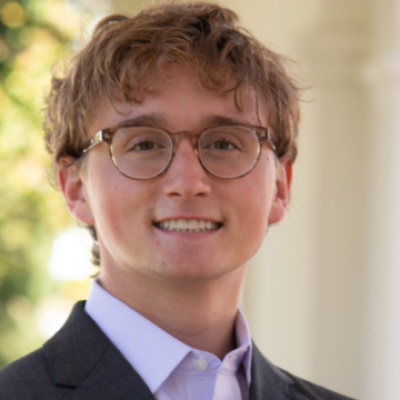This year, UVA Green Labs programs saw a 56% increase in participation in the Freezer Challenge, with thirty nine labs participating across the University.
More often than not, the best solution is also the most sustainable one. While some labs might be hesitant to adopt new, sustainable laboratory practices out of fear of compromising research integrity, this year's Freezer Challenge Winners, Kibbe-Tsihlis Lab’s researchers, “just don’t see how they conflict.”
2023 Freezer Challenge Winner: The Kibbe-Tsihlis Lab
The Kibbe-Tsihlis lab is a multidisciplinary research group of both scientists and physicians. Under Principal Investigators Dr. Melina Kibbe, Dean of the School of Medicine, and Dr. Nick Tsihlis, the researchers explore the unknowns of vascular system biology and work to develop novel therapies for treating vascular diseases. In addition to performing cutting-edge research, the Kibbe-Tsihlis lab is also a leader in sustainability. Their Green Labs Gold Certification, which recognizes the incorporation of sustainability into all aspects of everyday lab life, put them on the sustainability map. However, what catapulted the Kibbe-Tsihlis lab to Green Labs celebrity status was their exceptional performance in this year’s Freezer Challenge.
About the Freezer Challenge
UVA's Freezer Challenge is a part of the International Laboratory Freezer Challenge, an initiative designed to promote best care and maintenance practices for the management of cold storage units in laboratory spaces. Led by two nonprofits - My Green Lab and the International Institute for Sustainable Laboratories - the global initiative encourages healthy inter- and intra-institutional competition to achieve greater energy efficiency, sample storage safety, and cost savings. Since 2017, Freezer Challenge participants all over the world have saved a remarkable 44.7 million kWh of electricity and have reduced carbon emissions by over 31,000 metric tons by participating in this program.
As a part of the challenge, participating labs engage in actions such as defrosting an ultra-low temperature freezer or increasing their units’ temperature setpoints. These actions earn the participant points that are used as a marker for success and competition with other teams. These actions can also be translated into quantitative estimates of energy savings, giving participants a tangible metric for their success.
More about UVA's Freezer Challenge competition
Not only did the Kibbe-Tsihlis lab’s collective actions during the Freezer Challenge save 47 kWh of energy per day, but this number also almost doubles any other lab’s savings at UVA. From warming two ULT freezers from -80 °C to -70 °C to fully defrosting seven cold storage units, the entire Kibbe-Tsihlis team was invested in creating a high-performing yet sustainable research environment - proving that it’s possible to run a sustainable lab without compromising the research. While one might think performing at such a high level would require a strong push from lab leaders, according to lab manager Robin Siletzky, incorporating sustainable freezer practices into everyday lab life “fell naturally in place” for lab members.
This year, 39 labs across Grounds participated in the Freezer Challenge. Their collective actions saved approximately 425 kWh of electricity per day - equivalent to removing 21 average American households' energy use from UVA's daily footprint. In addition to creating a safer and more sustainable space to conduct research, participating labs received a freezer de-icing kit from the Green Labs Working Group to encourage the continuation of freezer maintenance practices.
Although labs account for about 13% of the University’s physical footprint, they account for roughly one third of its energy use. This disparity offers opportunity for high-impact, easily implementable work like the actions involved in the freezer challenge.
Freezers: Potential Energy Hogs
A single ultra-low temperature freezer consumes about 20 kWh of electricity per day, about the same as the daily consumption of a US household. Because of how energy intensive these units are, small actions that can be taken to improve energy efficiency yield great dividends. And while proper freezer care is a good way to reduce electricity consumption, improving freezer maintenance practices offer plenty of other benefits too.
First of all, a well-maintained freezer provides a safer environment for sample storage, which ensures the safety of irreplaceable scientific research. Maintaining the health of a freezer also helps the unit run more efficiently, which translates to smaller electricity costs and extension on the life of the unit. Lastly, neglected and unhealthy cold storage units tend to leak refrigerants, which are potent greenhouse gasses and pose risks to human health if inhaled.
Thank you, participating lab contestants!
We’re grateful for a lab community at UVA that is so committed to sustainability and reaching our 2030 UVA Sustainability Plan goals. If you’re interested in competing in the 2024 Freezer Challenge, sign up here. We’d like to recognize every participating lab at UVA and the people who led the effort in each group.
2023 Freezer Challenge Participants
Allison McCrady, M3 Lab
Amelia Reid, Machan Research Group
Angie Best, Isakson Lab
Anthony Bruce, Microvascular Engineering Lab
Cheryl Borgman, Janes Lab
Conrad Niebuhr, Luckey Lab
Dr. Antonio Vinicios Alves da Silva, Moore Lab
Dr. Casandra Hoffman, TransUniversity Microbiome Initiative
Dr. Gaëlle Auguste, Miller Lab
Dr. Glynis Kolling, Computational Systems Biology Lab
Dr. Golam Mohi, Mohi Lab
Dr. Jeffrey Ellena, Biomolecular Magnetic Resonance Facility
Dr. Katia Sol-Church, Genome Analysis and Technology Core
Dr. Mohan Manikkam, Fallahi-Sichani Lab
Dr. Poonam Sharma, Christ Lab
Elizabeth Nelson, Hirschi Lab
Emily Goetz, Castorani Lab
Fiona Flynn, First Lady's Food Lab
Gabi Martinez, Naegle Lab
Gina Calabrese, Farber Lab
Hao Zhang, Ai Lab
Johnson Ung, Loughran Lab
Juliana Jiranek, Gibson Lab
Juliana Trujillo, Griffin Lab
Kurt Langberg, Goldfarb Lab
Kyle McPherson, Bland Lab
Larry St. John, Jesse Beams Lab
Maggie McCartney, Blandy Experimental Farm Field Lab
Michael Chi, Abbas Lab
Michelle Barbeau, Cell Signaling Engineering Lab
Noah Perry, Civelek Lab
Peng Xu, Felder Innovation Lab
Rebecca Roberts, Erisir Lab
Rhea Braun, Ford Research Group
Robin Siletzky, Kibbe-Tsihlis Lab
Sara Adair, Bauer Lab
Tiffany Melhuish, Wotton Lab
Victoria Breza, Price Lab
Weronika Tomaka, Tamm Lab
For more information on the Freezer Challenge and the Green Labs program, please visit the UVA Green Labs page.
Charlie Vavrik is a 3rd year Sustainable Labs Student Employee and has worked in the Office for Sustainability since Spring 2023. He’s majoring in Synthetic Biology and does research in the Beenhakker Neuroscience laboratory. He became interested in the Sustainable Labs program after recognizing all the opportunities for high-impact work in lab spaces.



